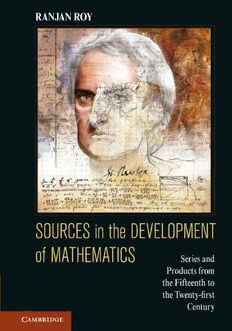Download Sources in the Development of Mathematics: Series and Products from the Fifteenth to the Twenty-first Century PDF Free - Full Version
Download Sources in the Development of Mathematics: Series and Products from the Fifteenth to the Twenty-first Century by Ranjan Roy in PDF format completely FREE. No registration required, no payment needed. Get instant access to this valuable resource on PDFdrive.to!
About Sources in the Development of Mathematics: Series and Products from the Fifteenth to the Twenty-first Century
The discovery of infinite products by Wallis and infinite series by Newton marked the beginning of the modern mathematical era. It allowed Newton to solve the problem of finding areas under curves defined by algebraic equations, an achievement beyond the scope of the earlier methods of Torricelli, Fermat, and Pascal. Newton and his contemporaries, including Leibniz and the Bernoullis, concentrated on mathematical analysis and physics. Euler's prodigious accomplishments demonstrated that series and products could also address problems in algebra, combinatorics, and number theory. Series and products have continued to be pivotal mathematical tools in the work of Gauss, Abel, and Jacobi in elliptic functions; in Boole's and Lagrange's infinite series and products of operators; in work by Cayley, Sylvester, and Hilbert in invariant theory; and in the present-day conjectures of Langlands, including that of Shimura-Taniyama, leading to Wiles's proof of Fermat's last theorem. In this book, Ranjan Roy describes many facets of the discovery and use of infinite series and products as worked out by their originators, including mathematicians from Asia, Europe, and America. The text provides context and motivation for these discoveries; the original notation and diagrams are presented when practical. Multiple derivations are given for many results, and detailed proofs are offered for important theorems and formulas. Each chapter includes interesting exercises and bibliographic notes, supplementing the results of the chapter. These original mathematical insights offer a valuable perspective on modern mathematics. Mathematicians, mathematics students, physicists, and engineers will all read this book with benefit and enjoyment.
Detailed Information
| Author: | Ranjan Roy |
|---|---|
| Publication Year: | 2011 |
| ISBN: | 9780521114707 |
| Pages: | 996 |
| Language: | English |
| File Size: | 4.39 |
| Format: | |
| Price: | FREE |
Safe & Secure Download - No registration required
Why Choose PDFdrive for Your Free Sources in the Development of Mathematics: Series and Products from the Fifteenth to the Twenty-first Century Download?
- 100% Free: No hidden fees or subscriptions required for one book every day.
- No Registration: Immediate access is available without creating accounts for one book every day.
- Safe and Secure: Clean downloads without malware or viruses
- Multiple Formats: PDF, MOBI, Mpub,... optimized for all devices
- Educational Resource: Supporting knowledge sharing and learning
Frequently Asked Questions
Is it really free to download Sources in the Development of Mathematics: Series and Products from the Fifteenth to the Twenty-first Century PDF?
Yes, on https://PDFdrive.to you can download Sources in the Development of Mathematics: Series and Products from the Fifteenth to the Twenty-first Century by Ranjan Roy completely free. We don't require any payment, subscription, or registration to access this PDF file. For 3 books every day.
How can I read Sources in the Development of Mathematics: Series and Products from the Fifteenth to the Twenty-first Century on my mobile device?
After downloading Sources in the Development of Mathematics: Series and Products from the Fifteenth to the Twenty-first Century PDF, you can open it with any PDF reader app on your phone or tablet. We recommend using Adobe Acrobat Reader, Apple Books, or Google Play Books for the best reading experience.
Is this the full version of Sources in the Development of Mathematics: Series and Products from the Fifteenth to the Twenty-first Century?
Yes, this is the complete PDF version of Sources in the Development of Mathematics: Series and Products from the Fifteenth to the Twenty-first Century by Ranjan Roy. You will be able to read the entire content as in the printed version without missing any pages.
Is it legal to download Sources in the Development of Mathematics: Series and Products from the Fifteenth to the Twenty-first Century PDF for free?
https://PDFdrive.to provides links to free educational resources available online. We do not store any files on our servers. Please be aware of copyright laws in your country before downloading.
The materials shared are intended for research, educational, and personal use in accordance with fair use principles.

